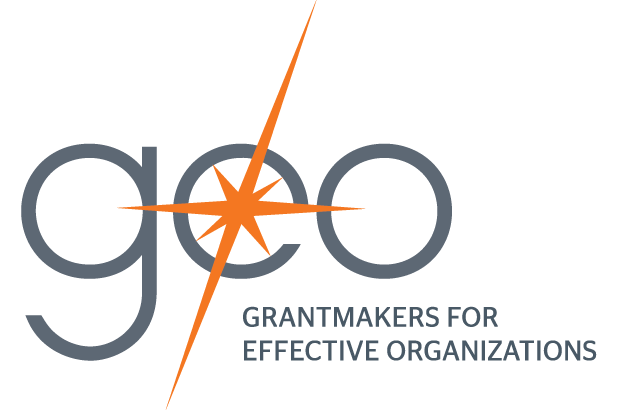At GEO, we believe that convening in person is an important mechanism for connecting with our members, hearing about their successes (and challenges) and brainstorming ways to support funders on a journey to embed racial equity within their grantmaking practice. Our in-person conferences are one of the things we offer to provide the forum for grantmakers to be together, have difficult conversations, explore how to better support their grantees and create real change in the communities they serve. Imagine our surprise in 2020, right before what was supposed to be GEO’s largest conference ever, when we had to cancel because of the Covid-19 pandemic.
The impacts of Covid-19 rippled in communities around the globe, and in our sector as well. Left and right, we saw grantmakers wondering if “business as usual” was sufficient and questioning what the future of the sector would, and should, look like. And just as grantmakers were embracing the changes needed to meet the moment, we too began thinking about how we might do the same for designing more equity-centered convenings.
Equity and Accessibility in a Virtual Environment
In planning GEO’s 2021 Learning Conference (the largest virtual event in GEO’s 20-year history), we found that creating an online community presents similar challenges and opportunities to an in-person offering.
As with all events, there are many factors that determine who can participate, including time, childcare, transportation, food options, wheelchair access and more. While both virtual and in person convenings require attention to accessibility and inclusion, we came away from the planning process realizing how much virtual events can offer in terms of accessibility that were previously out of reach with in person gatherings. On the other side of the coin, we also asked ourselves how we could account for boundaries and safety while building connections. Below are a few of the lessons and considerations we learned from planning GEO’s first virtual conference.
Disrupting Standards of “Professionalism”
The shift to virtual during the pandemic served as a critical reminder to offer more grace to one another. We all live busy, active lives outside of the office, but those walls came down as we shifted to work from home. From the beginning, we wanted to disrupt notions of what “belongs” in a home environment versus a professional environment, understanding that things like childcare, fast internet or separate offices to attend meetings might not be available to all attendees. If we reinforced some of these existing standards, we would do so at the risk of isolating people from participation.
Our solution, then, was to create a community of practice that would normalize dogs barking in the background, children being on camera or maintenance staff showing up at the apartment. We also wanted to tend to boundaries, acknowledging that we are in folks’ homes without being invited, which meant inviting folks to use Zoom backgrounds or be off camera. All in all, we saw the virtual environment as an opportunity to double down on a ‘new normal’ by encouraging our speakers, conference participants and GEO staff to show up as they are, cameras on or off and treat each other with grace when we inevitably get interrupted by the reality of working from home. While this was sometimes stressful on the logistics side, it made for a more intimate and powerful experience for our attendees.
Leaning Into Spontaneity
As conference planners, we are always accounting for the unknown. But instead of seeing the unknown as something to plan around and diminish, we realized spontaneity can present us with wonderful moments of community and joy. One of the highlights of our 2021 Learning Conference was two speakers joining from their cars while attending a community gathering in Minneapolis. When our speaker Leslie E. Redmond’s phone was having trouble connecting, she joined in the car of Dr. Brittany Lewis. Rather than control the moment – pausing the session, for instance – we watched it unfold. It was a powerful reminder of the importance of community and of the dynamics our nonprofit and grantee partners are navigating – always on the go, working within the communities – and how important it is for funders to be emergent and evolving in our work with our partners.
Prioritizing Safety
Finally, something we took seriously in the month leading up to the conference was equipping ourselves and each other to potentially deal with potential harassment online. We worked with GEO staff, our vendors, speakers and session designers to ensure everyone knew our policies, bystander intervention techniques and the ability to remove people from a Zoom room if they were being inappropriate. We broached conversations with presenters around what interrupting white dominant norms might look like in a session and what to do in cases of harassment.
Virtual environments replicate in person but oftentimes, our thinking went, harassers can feel more emboldened to act inappropriately over Zoom even if they wouldn’t have in person. We are grateful to have not had any reported incidents during the 2021 Learning Conference and glad we still took the time to prepare for a worst-case scenario.
Our experience preparing for the 2021 Learning Conference has created a stronger foundation for future in-person offerings. As we prepare for the 2022 National Conference in Chicago, we realize that the transition from our homes to a communal space requires adding, not removing. As we encourage grantmakers to create a new normal, we expect the same of ourselves as philanthropic professionals tasked with creating the container for transformation within the sector and always seek to build communities in a way that honor boundaries, accessibility and wellness, whether we are gathering behind a computer screen or in a plenary ballroom.

